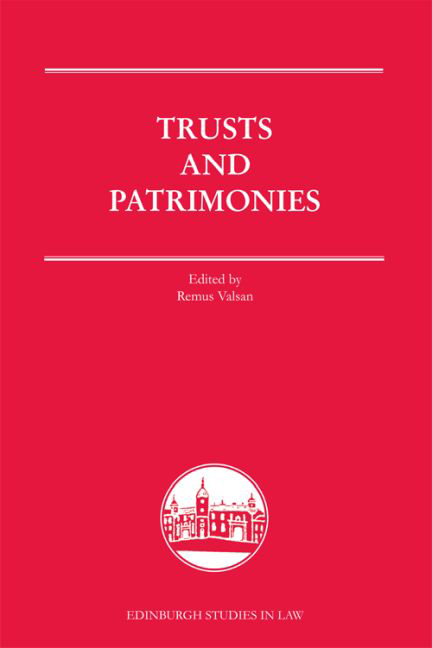Book contents
- Frontmatter
- Contents
- Preface and Acknowledgements
- List of Contributors
- List of Abbreviations
- Table of Cases
- INTRODUCTION
- PART I PATRIMONY AND THE COMMON LAW TRUST
- 2 Lepaulle Appropriated
- 3 Trust and Patrimony
- 4 Square Peg, Round Hole? Patrimony and the Common Law Trust
- PART II PATRIMONY AND THE SCOTTISH TRUST
- PART III TRUST AND PATRIMONY IN FRANCE, QUEBEC AND THE NETHERLANDS
- Index
3 - Trust and Patrimony
from PART I - PATRIMONY AND THE COMMON LAW TRUST
Published online by Cambridge University Press: 15 September 2017
- Frontmatter
- Contents
- Preface and Acknowledgements
- List of Contributors
- List of Abbreviations
- Table of Cases
- INTRODUCTION
- PART I PATRIMONY AND THE COMMON LAW TRUST
- 2 Lepaulle Appropriated
- 3 Trust and Patrimony
- 4 Square Peg, Round Hole? Patrimony and the Common Law Trust
- PART II PATRIMONY AND THE SCOTTISH TRUST
- PART III TRUST AND PATRIMONY IN FRANCE, QUEBEC AND THE NETHERLANDS
- Index
Summary
INTRODUCTION
The trust is one of the characteristic features of the common law tradition, but it is not confined to the common law world. An established law of trusts, combined with a civilian understanding of property law, is found in a number of jurisdictions, including both mixed jurisdictions and pure civil law systems. It is clearly possible to have “trusts without Equity”. In this paper, I will attempt to show that the way in which these jurisdictions understand the trust can help common lawyers to understand better their own trust institution. This often happens when we look at our law “outside- in”; that is, when we try to see it with the eyes of others.
The main part of this paper is devoted to asking whether the common law trust can be understood as a patrimony in the civilian sense. Contrary to the position taken by the French jurist Pierre Lepaulle, I show that it cannot. The reasons why it cannot be so understood require us to take careful note of several features of the common law trust that are not always noticed even by common lawyers. The essence of the common law trust lies not in any division of ownership of the trust property; this is a metaphor that is as likely to confuse as it is to enlighten. Rather it lies in the fact that the trust beneficiaries hold rights in the rights that the trustee holds as trust property. In the conclusion, I relate the trust institution to the idea of legal personality. The common law trust is not a legal person; I argue that it would be a mistake for any legal system to conceptualise the trust as a legal person, since the result will only be to eliminate the trust as a fundamental legal institution.
IS THE COMMON LAW TRUST A PATRIMONY?
Lepaulle's theory
One of the most famous outside-in looks at the common law trust was that of Pierre Lepaulle. He concluded that the common law trust could best be understood, in civilian terms, as a patrimony affected to a destination or purpose.
- Type
- Chapter
- Information
- Trusts and Patrimonies , pp. 42 - 61Publisher: Edinburgh University PressPrint publication year: 2015

